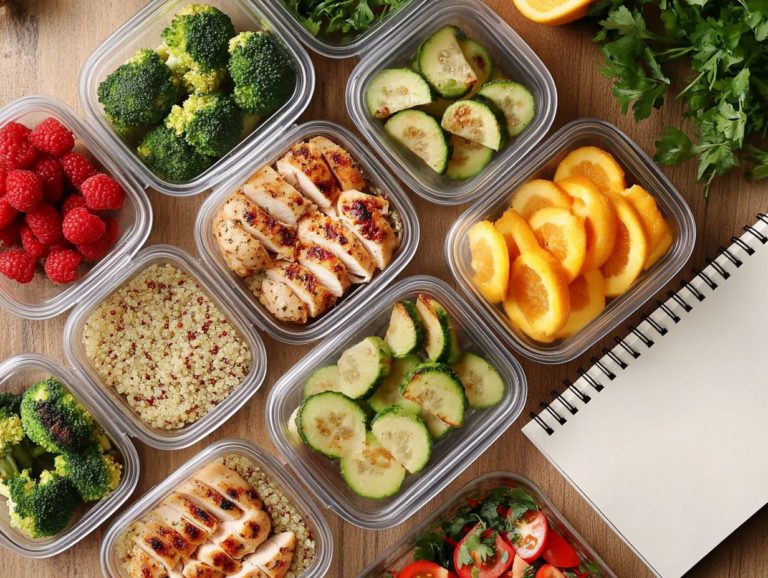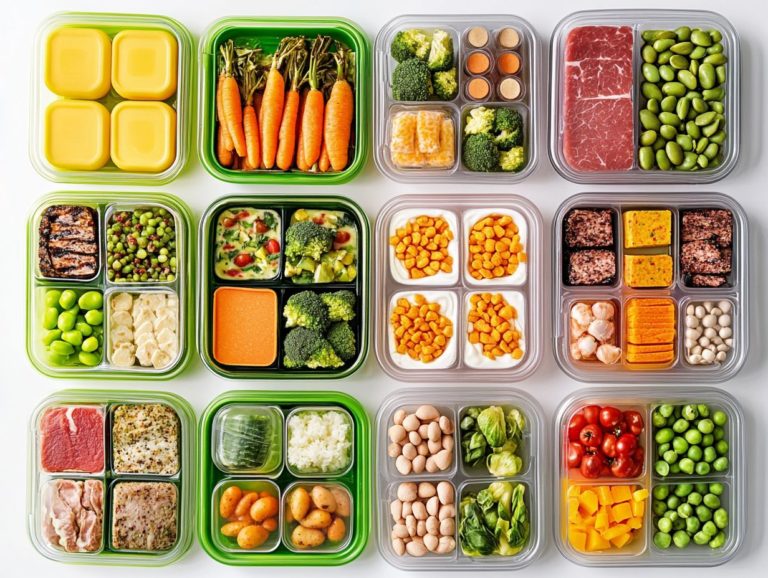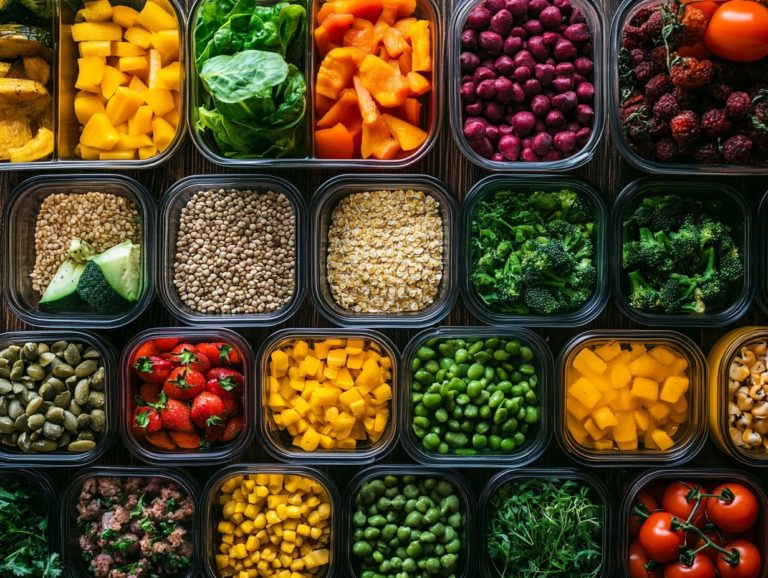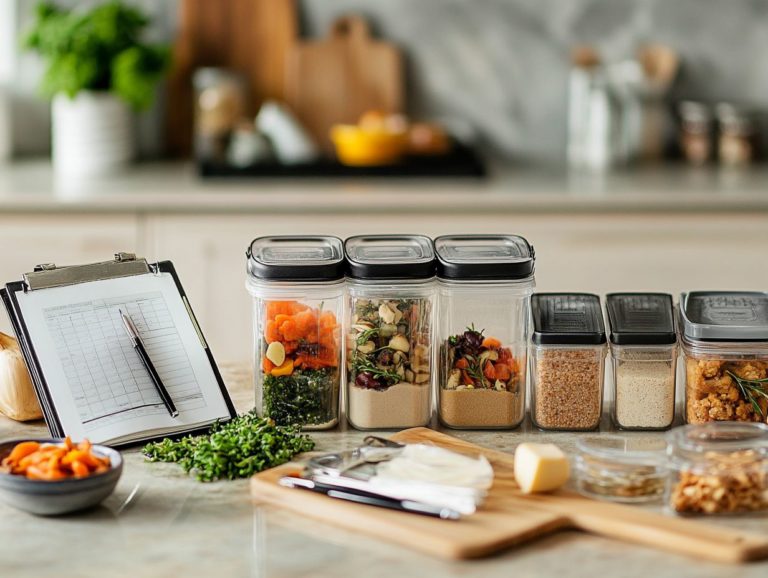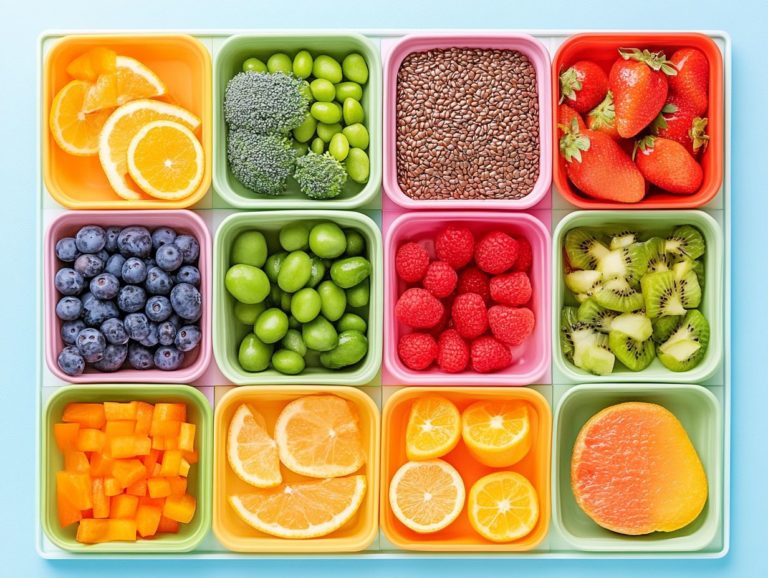How to Stay Committed to Your Meal Plan
Meal planning goes beyond just organizing your weekly meals. It is a powerful strategy to improve your health and nutrition.
By understanding its many benefits, you can set realistic goals and create effective preparation tactics that fit seamlessly into your lifestyle. Challenges like cravings and unexpected events may disrupt your progress at times.
This guide will help you create a meal plan that works for you, overcome obstacles, and maintain a long-term commitment while ensuring your meals are diverse and enjoyable.
Prepare to revolutionize your relationship with food!
Contents
- Key Takeaways:
- Understanding the Importance of Meal Planning
- Tips for Creating and Sticking to a Meal Plan
- Dealing with Challenges and Setbacks
- Maintaining Long-Term Commitment to Your Meal Plan
- Frequently Asked Questions
- How can I stay motivated to follow my meal plan?
- What should I do if I fall off track with my meal plan?
- Is it okay to have cheat meals while following a meal plan?
- How can I avoid boredom with my meal plan?
- What should I do if I have a busy schedule?
- How can I deal with cravings while following a meal plan?
Key Takeaways:
- Meal planning is vital for your health and nutrition.
- Set realistic goals and use strategies like batch cooking.
- Overcoming setbacks is key to maintaining your meal plan.
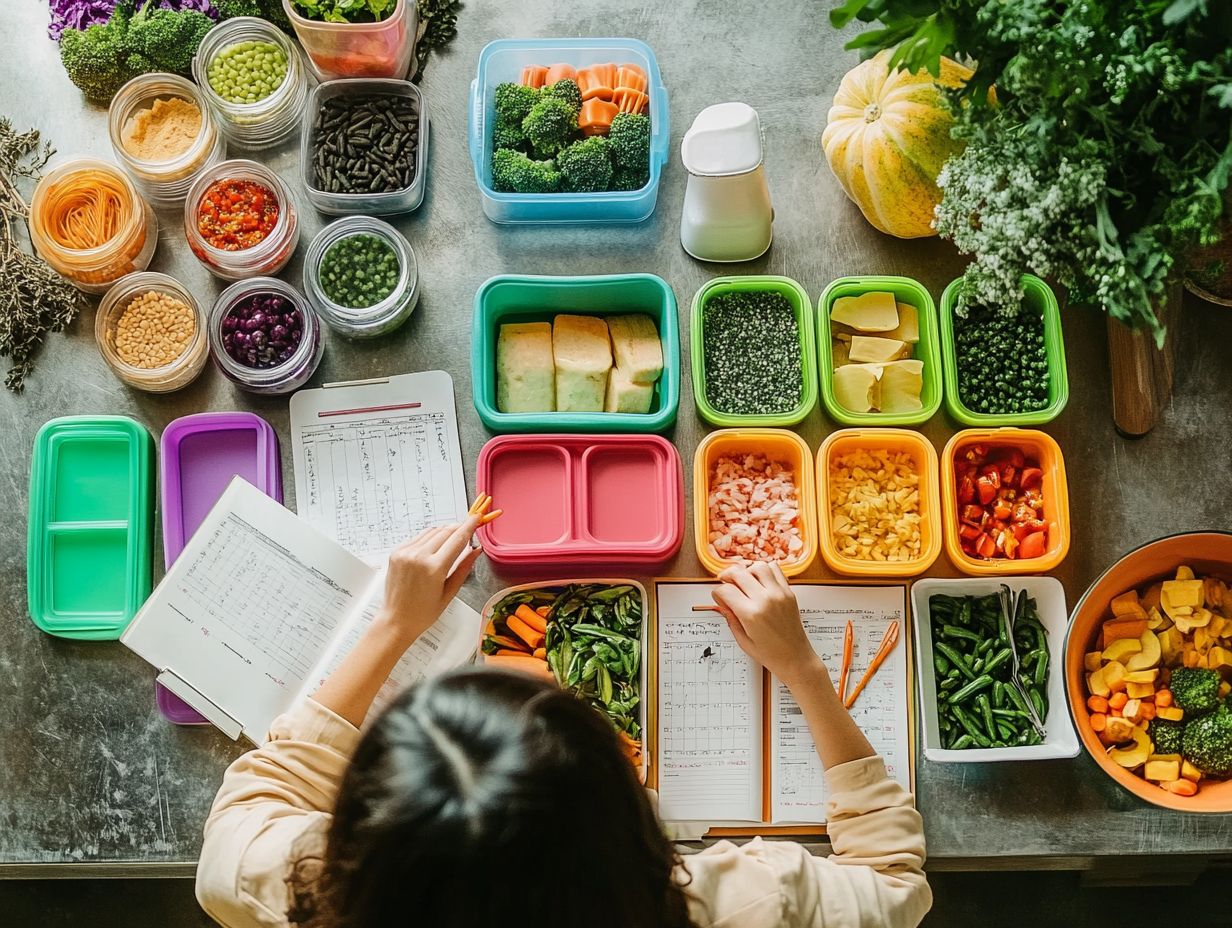
Understanding the Importance of Meal Planning
Meal planning is essential for your nutritional wellness. It acts as a cornerstone strategy for anyone looking to enhance their health through better eating habits.
By organizing your meals in advance, you can enjoy a balanced diet filled with whole foods while also catering to your unique dietary preferences and nutritional goals.
Thoughtful meal planning helps you manage portion sizes and sugar intake, strengthening your commitment to dietary changes.
This approach promotes lasting health improvements and cultivates healthier eating habits over time.
Benefits for Overall Health and Nutrition
Meal planning offers many benefits that can significantly boost your overall health and nutrition. It helps you stick to a balanced diet and manage your dietary habits more easily.
By planning your meals ahead of time, you can achieve better portion control, preventing overeating and encouraging a healthier lifestyle. This structured approach makes it easier to increase your intake of fresh fruits and vegetables, ensuring a variety of vital nutrients in your daily meals.
For example, including a vibrant salad with leafy greens, cherry tomatoes, and cucumbers can enhance your vitamin intake. Likewise, wholesome grains like quinoa or brown rice provide essential fibers and proteins.
Thoughtful meal planning also helps you achieve a better balance of proteins, fats, and carbohydrates. This allows you to enjoy healthier fats from nuts and avocados as well as lean proteins from fish and legumes. The result is more energy and an overall sense of well-being.
Tips for Creating and Sticking to a Meal Plan
Creating and sticking to a meal plan might seem overwhelming initially. However, with the right strategies and personalized guidance, you can develop successful healthy eating habits and sustainable dietary changes.
Integrating budget-friendly tips and effective meal prep techniques can streamline the process and enhance your experience.
Self-monitoring your progress boosts your motivation and accountability, making it easier to align with your health goals.
Setting Realistic Goals
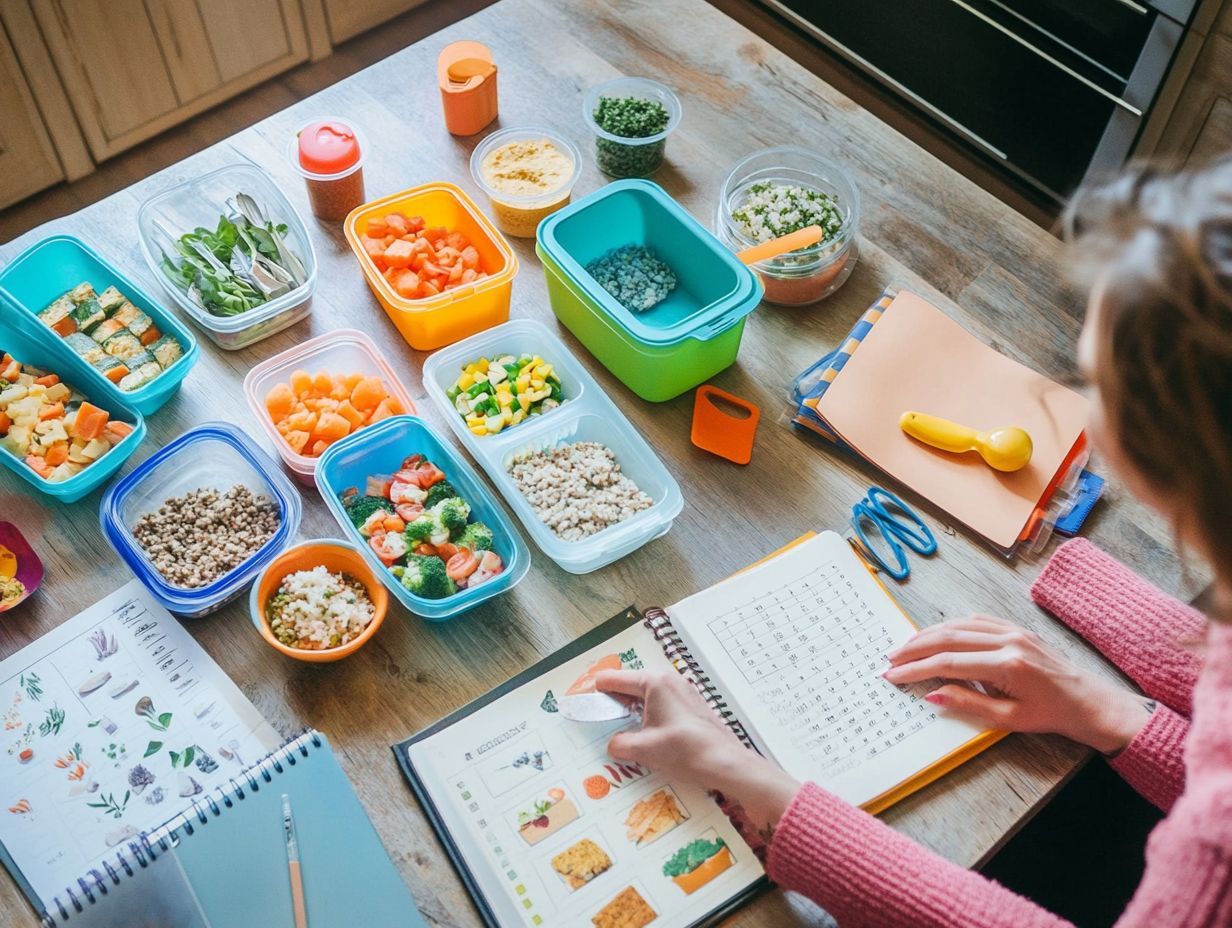
Setting realistic goals is a crucial step in your meal planning journey. It lays the foundation for developing long-term healthy eating habits and making effective dietary changes.
By identifying specific, measurable health objectives that fit your lifestyle, you can carve a sustainable path toward improved nutrition.
For instance, making gradual changes like choosing healthier snack options or adding more vegetables to your meals can significantly enhance your overall dietary quality without overwhelming you.
Managing portion sizes and curbing cravings are vital aspects of this process. Using smaller plates or practicing mindful eating can help you tune into your true hunger signals.
Regularly tracking your progress, whether through meal journaling or using apps, reinforces your accomplishments and keeps your motivation high, turning these small, attainable goals into lasting habits.
Start planning your meals today and take the first step toward a healthier you!
Meal Preparation Strategies
Implementing effective meal preparation strategies can truly be the key to transforming your week from chaotic food choices to a well-structured meal plan.
By adopting a variety of cooking methods and techniques, you can streamline your meal prep and pave the way for a healthier lifestyle.
Batch cooking stands out as an exceptional approach, allowing you to prepare large quantities of food in advance, ready for your busy days ahead.
Get creative with your leftovers to minimize waste and add variety to your meals.
For example, those roasted vegetables from last night can find a new life when tossed into a quinoa salad or blended into a wholesome soup.
It’s essential to rotate your ingredients to keep things interesting.
Explore recipes that showcase whole grains like brown rice or farro, paired with vibrant vegetables and healthy fats such as avocados or nuts.
These mindful practices help you keep portions in check and contribute to a balanced diet, ensuring that each meal you enjoy is both satisfying and nutritious.
Dealing with Challenges and Setbacks
Navigating the challenges and setbacks that come with meal planning can be quite the endeavor.
However, mastering the art of managing cravings and adapting to unexpected events is essential for ensuring your long-term success in this journey.
Overcoming Temptations and Cravings
Overcoming temptations and managing cravings are essential components of successful meal planning and healthy eating, especially when you find yourself facing emotional eating triggers.
This challenge can often feel overwhelming, particularly during those stressful moments when the allure of comfort food becomes nearly irresistible.
However, there are practical strategies you can implement to take control of your cravings.
By incorporating smart snacking options into your routine think crunchy vegetables paired with hummus or a handful of nuts you can satisfy your hunger without derailing your dietary goals.
Preparing healthy recipes that feature nutritious foods, such as a quinoa salad loaded with avocados and beans, offers both nutrition and enjoyment, helping to break the cycle of emotional eating.
Understanding these aspects enables you to make better choices, ultimately paving the way for lasting health and well-being.
Adjusting for Unexpected Events
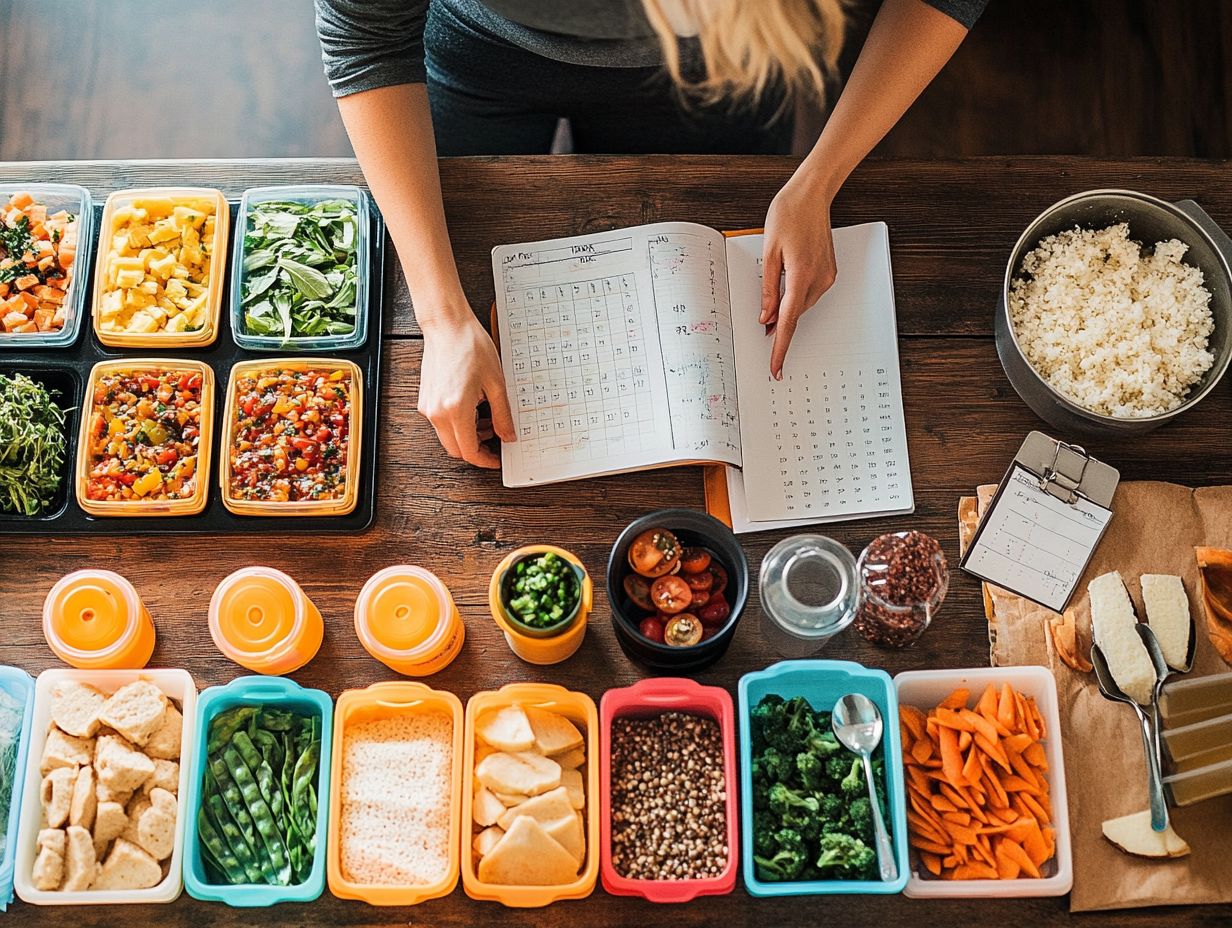
Life can surprise you at any moment, so be ready!
Taking the time to craft a meal plan that adapts to your changing schedule allows you to glide through unexpected events, whether it s an impromptu dinner invitation or a last-minute work commitment.
Embracing variety in your meals not only tantalizes your taste buds but also ensures your nutritional needs are met.
Think about quick and healthy recipes, like stir-fried vegetables paired with lean protein or whole grain salads, that you can prepare in advance and stash away for those hectic days.
By sharing your meal planning strategies within your community, you can create a supportive environment that inspires others to remain dedicated to their health goals.
Maintaining Long-Term Commitment to Your Meal Plan
To maintain a long-term commitment to your meal plan, you must embrace ongoing dedication, flexibility, and the capacity to adapt to evolving circumstances, while also learning how to stay motivated for healthy eating and prioritizing your nutritional needs.
Incorporating Variety and Flexibility
Incorporating variety and flexibility into your meal plan is essential to avoiding burnout and keeping your enthusiasm for healthy eating alive.
By exploring diverse recipes and swapping ingredients, you can cater to various dietary preferences while still enjoying delicious meals.
For instance, substituting quinoa for rice or chickpeas for meat not only introduces new flavors and textures but also transforms each dish into something exciting.
Understanding the importance of portion control can help you maintain a balanced diet without feeling deprived.
By being adaptable and open to experimentation, you can create a sustainable approach to nutrition that satisfies your palate and promotes a healthier lifestyle over time.
Start your meal planning journey today, and try a new recipe this week!
Finding Support and Accountability
A supportive community can boost your meal planning commitment. Establishing ways to stay on track is crucial for achieving your health goals.
By connecting with community support groups, whether in-person or online, you unlock a wealth of shared experiences, tips, and resources.
These groups center around similar health objectives, creating an environment where members uplift each other in sticking to their nutrition plans. Accountability partners play an essential role, regularly checking in, sharing progress, and offering tailored advice.
The camaraderie in these communities is truly empowering. You and your peers celebrate successes and navigate challenges together, making it more manageable to stay motivated and accountable on your journey toward better health.
Frequently Asked Questions
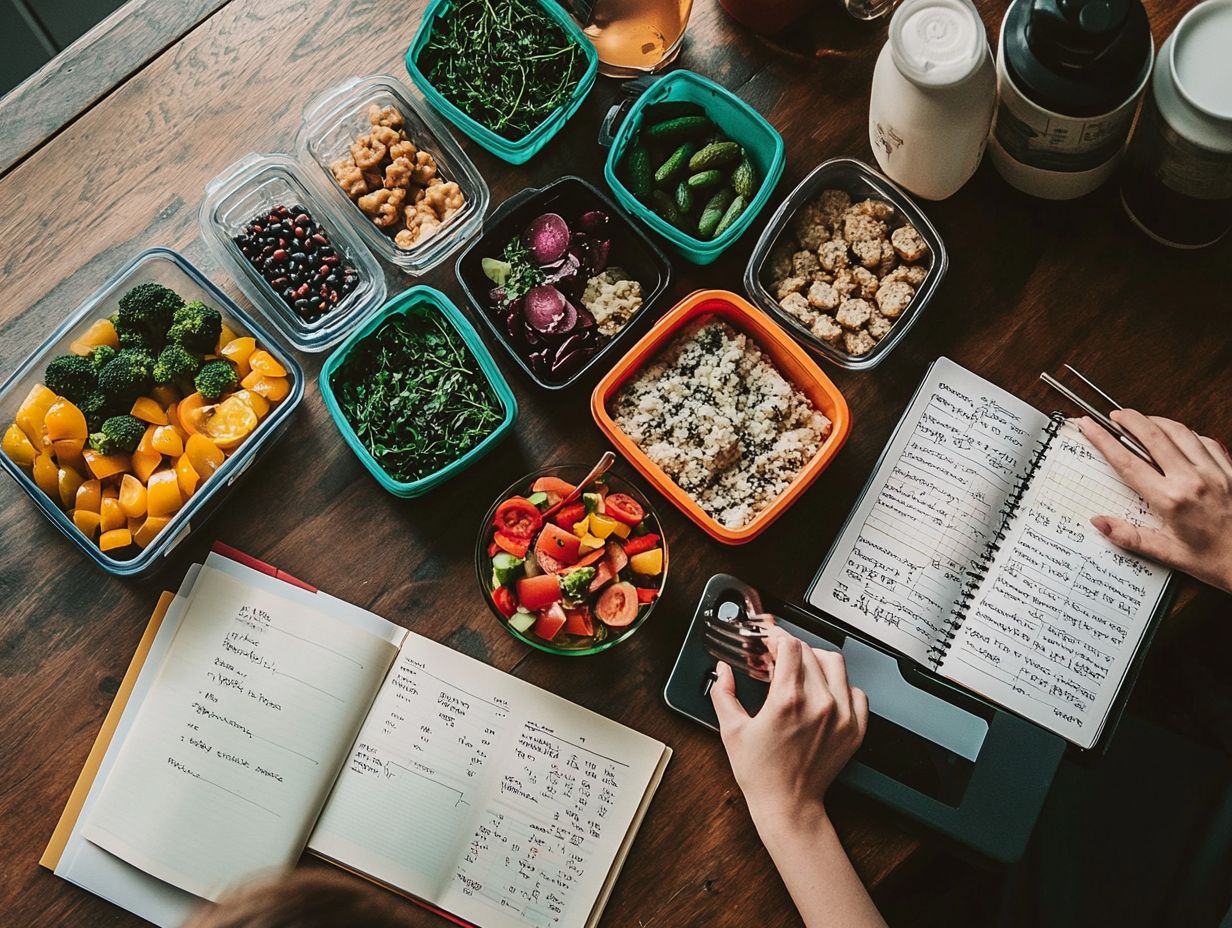
How can I stay motivated to follow my meal plan?
Staying motivated can be challenging, but there are ways to maintain your commitment. Set achievable goals and reward yourself when you reach them. Find an accountability partner or join a support group for extra encouragement.
What should I do if I fall off track with my meal plan?
It’s normal to make mistakes occasionally, but don t punish yourself for it. Focus on getting back on track as soon as possible. Reflect on what may have led you astray and make the necessary adjustments to prevent it from happening again.
Is it okay to have cheat meals while following a meal plan?
Yes, it is perfectly fine to have occasional cheat meals while following a meal plan. In fact, allowing yourself some flexibility can help you stay committed long-term. Just ensure that cheat meals don t become a regular occurrence and try to make healthier choices during those moments.
How can I avoid boredom with my meal plan?
Eating the same meals every day can quickly become monotonous. It’s essential to mix things up to avoid boredom. Get creative with your recipes or try new foods and cooking methods. You can also plan a “cheat meal” or “reward day” once a week to look forward to.
What should I do if I have a busy schedule?
A busy schedule can make it challenging to stick to a meal plan, but it s not impossible. Meal prep or batch cooking on weekends can save time during the week. Opt for quick and easy meals like salads, sandwiches, or smoothies. Don’t forget to plan your meals and snacks in advance to stay on track.
How can I deal with cravings while following a meal plan?
Cravings are a natural part of any diet, but there are ways to manage them. First, ensure you re eating balanced meals that include proteins, healthy fats, and fiber to stay satisfied. Second, try distracting yourself with a non-food-related activity or drink a glass of water. If the craving persists, allow yourself a small portion of the food in moderation.

